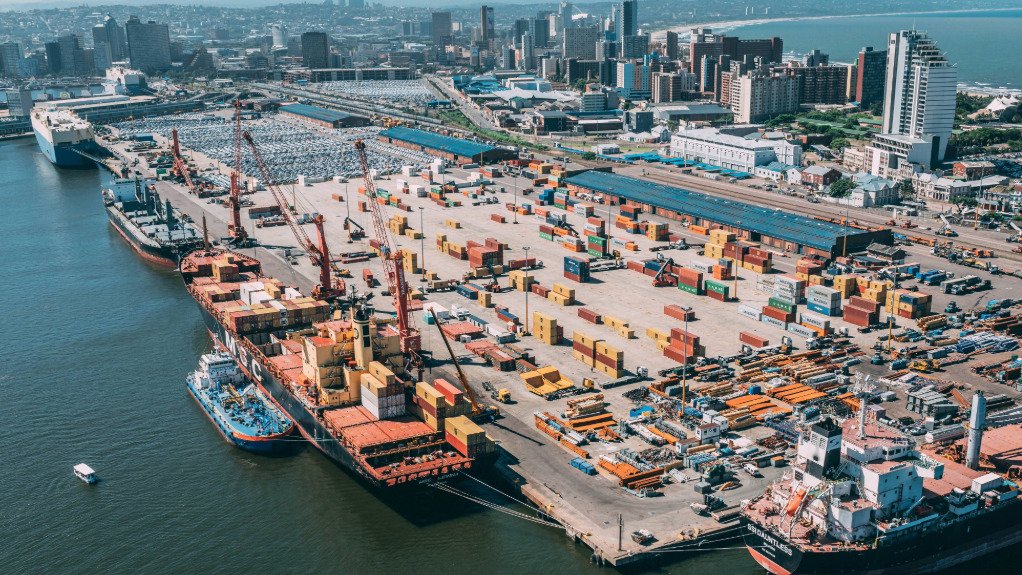RFA, SAAFF call for greater urgency on private sector’s participation in ports
Following the recent High Court judgment on the Durban Container Terminal (DCT) Pier 2, which halted the contract between Transnet and International Container Terminal Services (ICTSI), the Southern African Association of Freight Forwarders (SAAFF) has highlighted the key role it believes the private sector could play in South Africa’s logistics network.
While the court’s decision raises significant procedural issues, the SAAFF says it sees this as a crucial opportunity to revamp and fortify the frameworks for private-sector investment and inter-port competition.
The association posits that the Durban port, which has grappled with inefficiencies and operational delays for many years, represents the broader challenges facing South Africa’s logistics infrastructure.
The Road Freight Association (RFA) notes in a separate statement that it has noted the High Court’s ruling “with dismay”.
“While the intricacies and deeper arguments that have given rise to the Interdict by the High Court are not known to the RFA, it is a pity that – according to some of the argument forwarded – this process of implementing a private operation in the Port of Durban, which has been under way for a number of years, still has not resulted in efficiencies being improved at the port,” the association states.
It says it has, on numerous occasions over the past two decades of engagement with Transnet and Transnet Port Terminals, raised the dire need to improve operations, efficiencies and capacity at the Port of Durban.
“The reality has been that our neighbours have upped their game, that shipping lines are choosing different ports of call and that the logistic supply chain is, in reality, shrinking through South African ports and moving to other ports.
“We cannot, as a country and, more importantly, as the logistics supply chain, allow this trend to continue.
“Rail and ports have declined to such an extent that we are the laughing stock of many African countries (and they are benefitting greatly), but more importantly we are going to lose primary and support industry sectors, shed jobs and bleed revenue from a national fiscus that is already in dire straits,” the RFA asserts.
It says the private sector must be brought in to save the status of South Africa as a logistics hub and node – both for trans-African trade and for regional and national trade.
“The RFA trusts that, through the court process, a fair and transparent introduction of private players into the Port of Durban (and other ports) will now start and become a reality.
“We cannot wait any longer. We cannot continue to be a second or last choice for those international shipping businesses, companies and industries that wish to do business within and to the north of South Africa,” the association states.
The RFA notes that the association supports the initiatives to bring private players into the Port of Durban, as well as supports a transparent and fair process ensuring that South Africa gets the best value possible for the price paid, as well as a system that will be innovative, efficient and progressive to meet the demands of the future, not just the demands of today.
The SAAFF, meanwhile, asserts that the inclusion of experienced private-sector partners, like those involved in the bidding process for DCT Pier 2, can play a pivotal role in addressing these challenges.
“The court’s ruling highlights the importance of transparency and fairness in selecting private partners, but it should not deter the progress towards greater private involvement. On the contrary, the urgency for private sector expertise to co-manage, invest and modernise our ports has never been more apparent,” the SAAFF says in a statement.
While it acknowledges that Transnet’s initiatives to attract equity partners are a step in the right direction, the SAAFF calls for the process to be more transparent and inclusive, focusing on attracting global players who can contribute financially through technology, skills transfer and operational know-how.
“Successful private sector participation can lead to quicker improvements in terminal productivity, reduced ship turnaround times and better service delivery to local and international traders,” it stresses.
The SAAFF avers that South Africa’s ports operate in an environment without meaningful competition between ports and within individual port terminals, which it says have caused complacency and inefficiencies that have compounded operational challenges.
To break this cycle, the association advocates establishing inter-port and intra-port competition frameworks.
By fostering competition among terminals and between ports, operational efficiencies can be improved, costs can be reduced and service standards can be elevated across the board, the association posits.
“A model where different operators manage different terminals within the same port or where different ports compete for similar cargo, will ultimately benefit the entire logistics value chain.
“This competition would encourage all players to innovate, invest in better technologies, and improve their performance to stay relevant in a competitive landscape,” it suggests.
The SAAFF also acknowledges the financial pressures Transnet is facing, but says it strongly believes that attracting private investment into the ports should be viewed as a priority to unlock the full potential of South Africa’s trade corridors.
“While the legal process must unfold, the SAAFF urges all parties to expedite efforts to finalise the transaction in the economy's best interest.”
Article Enquiry
Email Article
Save Article
Feedback
To advertise email advertising@creamermedia.co.za or click here
Press Office
Announcements
What's On
Subscribe to improve your user experience...
Option 1 (equivalent of R125 a month):
Receive a weekly copy of Creamer Media's Engineering News & Mining Weekly magazine
(print copy for those in South Africa and e-magazine for those outside of South Africa)
Receive daily email newsletters
Access to full search results
Access archive of magazine back copies
Access to Projects in Progress
Access to ONE Research Report of your choice in PDF format
Option 2 (equivalent of R375 a month):
All benefits from Option 1
PLUS
Access to Creamer Media's Research Channel Africa for ALL Research Reports, in PDF format, on various industrial and mining sectors
including Electricity; Water; Energy Transition; Hydrogen; Roads, Rail and Ports; Coal; Gold; Platinum; Battery Metals; etc.
Already a subscriber?
Forgotten your password?
Receive weekly copy of Creamer Media's Engineering News & Mining Weekly magazine (print copy for those in South Africa and e-magazine for those outside of South Africa)
➕
Recieve daily email newsletters
➕
Access to full search results
➕
Access archive of magazine back copies
➕
Access to Projects in Progress
➕
Access to ONE Research Report of your choice in PDF format
RESEARCH CHANNEL AFRICA
R4500 (equivalent of R375 a month)
SUBSCRIBEAll benefits from Option 1
➕
Access to Creamer Media's Research Channel Africa for ALL Research Reports on various industrial and mining sectors, in PDF format, including on:
Electricity
➕
Water
➕
Energy Transition
➕
Hydrogen
➕
Roads, Rail and Ports
➕
Coal
➕
Gold
➕
Platinum
➕
Battery Metals
➕
etc.
Receive all benefits from Option 1 or Option 2 delivered to numerous people at your company
➕
Multiple User names and Passwords for simultaneous log-ins
➕
Intranet integration access to all in your organisation




















